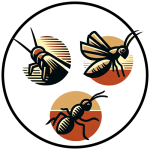
Scorpion Pest Control
- San Tan Valley, Arizona
- (480) 737-7901
- office@stomppestcontrolaz.com
- Office Hours M-F 8:00am - 5:00PM
Scorpion Pest Control
For Service Call or Send us a message
in the form below
Scorpion Pest Control
Key Points Section
- Importance of Professional Control: Ensures safety and comprehensive solutions.
- Arizona Scorpion Challenges: Warm climate and desert landscape promote infestations.
- Scorpion Species and Behavior: Includes the Arizona Bark Scorpion, known for its venomous sting.
- Professional Methods: Effective extermination and regular treatments.
- Best Practices: Use of effective insecticides, physical removal, and green options.
- Preventive Measures: Home sealing and yard maintenance.
- Why Choose Stomp Pest Control: Expertise, customized plans, and eco-friendly approaches.
Definitions Section
- Scorpion Pest Control: Measures taken to manage and eliminate scorpions.
- Scorpion Extermination: The process of killing scorpions using various methods.
- Green Pest Control: Eco-friendly pest management strategies.
- Home Sealing: Sealing entry points to prevent scorpions from entering the home.
- Yard Treatment: Techniques used to keep scorpions out of outdoor areas.
Importance of Professional Scorpion Pest Control
 Scorpions are a common and potentially dangerous pest in Arizona, known for their painful stings and ability to invade homes and yards. Effective scorpion pest control is essential for ensuring the safety and comfort of your living environment. While DIY methods can offer temporary relief, professional scorpion pest control provides comprehensive and long-lasting solutions. Professionals are equipped with the knowledge, tools, and experience to tackle scorpion infestations effectively, reducing the risk of recurring problems.
Scorpions are a common and potentially dangerous pest in Arizona, known for their painful stings and ability to invade homes and yards. Effective scorpion pest control is essential for ensuring the safety and comfort of your living environment. While DIY methods can offer temporary relief, professional scorpion pest control provides comprehensive and long-lasting solutions. Professionals are equipped with the knowledge, tools, and experience to tackle scorpion infestations effectively, reducing the risk of recurring problems.
Overview of Scorpion Problems in Arizona
Scorpions are a significant concern for residents of Arizona due to a combination of environmental, behavioral, and health-related factors. Understanding why scorpions are a problem in this region can help homeowners take effective measures to manage and prevent infestations.
1. Climate and Environment
- Ideal Habitat: Arizona’s warm climate and desert landscape provide an ideal habitat for scorpions. They thrive in hot, dry conditions and can find ample shelter in the natural environment.
- Seasonal Activity: Scorpions are most active during the warmer months, particularly from March to October. During this time, they are more likely to enter homes in search of food and cooler temperatures.
2. Urbanization and Habitat
- Proximity to Human Habitats: As urban development expands into previously uninhabited desert areas, scorpions’ natural habitats overlap with residential neighborhoods. This increases the likelihood of scorpions entering homes and yards.
- Shelter and Resources: Scorpions seek out places that provide shelter and food. Homes, with their numerous hiding spots and potential insect prey, can attract scorpions looking for these resources.
3. Behavior and Adaptability
- Nocturnal Habits: Scorpions are nocturnal, meaning they are active at night when it is cooler. This can lead to unexpected encounters with humans during evening and nighttime hours.
- Seclusion and Hiding: Scorpions are adept at finding secluded, dark places to hide during the day. Common hiding spots include under rocks, in woodpiles, inside shoes, and in dark corners of homes.
4. Health Risks
- Venomous Stings: The Arizona Bark Scorpion, in particular, poses a significant health risk due to its venomous sting. While most scorpion stings are not life-threatening, they can cause severe pain, swelling, and other symptoms. In some cases, especially for young children, the elderly, or individuals with allergies, a sting can require medical attention.
- Allergic Reactions: Some individuals may experience allergic reactions to scorpion stings, which can range from mild to severe. Immediate medical attention may be necessary in such cases.
5. Challenges in Control
- Resilience: Scorpions are resilient creatures that can survive in harsh conditions. They are also difficult to eliminate completely due to their ability to hide in small crevices and their nocturnal nature.
- Breeding: Scorpions can reproduce relatively quickly, and a single female can give birth to numerous offspring. This can lead to rapid population growth if not managed effectively.
Types of Scorpions Most Prevalent in Arizona
Arizona is home to a variety of scorpion species, each with its own distinct characteristics and behaviors. Understanding these species can help in identifying and managing scorpion infestations effectively. Here are the most prevalent scorpions found in Arizona:
1. Arizona Bark Scorpion (Centruroides sculpturatus)
Description:
- Color: Light brown to yellowish-tan.
- Size: Typically 2.5 to 3 inches long.
- Distinct Features: Slim body and long, slender pincers.
Behavior and Habitat:
- Venom: The most venomous scorpion in North America, capable of delivering a painful sting that can be dangerous, especially to children and the elderly.
- Habits: Nocturnal and prefers cool, moist environments. Often found in homes, hiding in dark places like shoes, closets, and under furniture.
- Habitat: Commonly found in woodpiles, under rocks, and in tree bark.
2. Giant Hairy Scorpion (Hadrurus arizonensis)
Description:
- Color: Yellow with a darker back.
- Size: One of the largest scorpions in the United States, reaching up to 6 inches in length.
- Distinct Features: Covered in fine hairs that help detect vibrations.
Behavior and Habitat:
- Venom: Its sting is painful but not typically dangerous to humans.
- Habits: Nocturnal and burrowing; prefers sandy or loose soil where it can dig.
- Habitat: Found in deserts, often burrows under rocks or other debris for shelter.
3. Striped Tail Scorpion (Vaejovis spinigerus)
Description:
- Color: Light tan with distinctive dark stripes on the back.
- Size: About 2.5 inches long.
- Distinct Features: Stocky body and thick pincers.
Behavior and Habitat:
- Venom: The sting is painful but usually not medically significant.
- Habits: Nocturnal and often found near human dwellings.
- Habitat: Prefers rocky areas and is commonly found under debris, logs, and rocks.
4. Desert Hairy Scorpion (Hadrurus spadix)
Description:
- Color: Yellow with a darker back similar to the Giant Hairy Scorpion but smaller in size.
- Size: Typically 4 to 5 inches long.
- Distinct Features: Similar in appearance to the Giant Hairy Scorpion but with slight variations in color and size.
Behavior and Habitat:
- Venom: Its sting is painful but generally not harmful to humans.
- Habits: Nocturnal, spends the day in burrows or under rocks.
- Habitat: Found in deserts, often near dry washes and rocky outcrops.
Key Points for Identifying and Managing Scorpions in Arizona
- Identification: Recognizing the specific species is crucial for effective control and treatment.
- Habitat Management: Reducing clutter, sealing entry points, and maintaining a clean yard can help minimize scorpion habitats.
- Professional Control: Due to the venomous nature of some species, professional pest control services are recommended for managing scorpion infestations safely and effectively.
Scorpion Habits and Habitats
Scorpions are nocturnal and prefer cool, dark, and moist environments. They are often found under rocks, in woodpiles, and within homes, especially in basements and bathrooms. Scorpions can enter homes through small cracks and crevices, making it essential to seal entry points effectively.
Scorpion Extermination Methods
Professional scorpion control services utilize a variety of extermination methods tailored to the specific needs of the infestation. These methods include targeted insecticide applications, trapping, and environmental modifications to reduce scorpion habitats.
Effectiveness of Professional Scorpion Control
Professional scorpion control is highly effective due to the expertise and comprehensive approach employed by pest control specialists. Regular treatments and monitoring ensure that scorpion populations are kept under control, providing peace of mind for homeowners.
Insecticides Effective Against Scorpions
The best insecticides for scorpions are those specifically formulated to target their physiology. Products containing ingredients such as pyrethroids and deltamethrin are known to be effective. These insecticides are applied in strategic locations to maximize their impact.
Methods to Kill and Remove Scorpions
In addition to chemical treatments, physical removal methods such as trapping can be used to control scorpions. Regular inspections and prompt removal of scorpions found inside the home are essential practices.
Green and Natural Scorpion Pest Control Options
For those seeking eco-friendly options, green scorpion pest control methods include the use of natural predators, essential oils, and organic insecticides. These methods can be effective when combined with preventive measures and regular monitoring.
Effectiveness of All-Natural Scorpion Pesticides
All-natural scorpion pesticides, often preferred for their eco-friendly and non-toxic properties, can offer a degree of control over scorpion populations. However, their effectiveness may vary based on several factors, including the severity of the infestation, the specific natural ingredients used, and the application methods.
Key Factors Influencing Effectiveness
Type of Natural Ingredients:
- Essential Oils: Certain essential oils, such as cedarwood, lavender, and peppermint, are known to repel scorpions. These oils can be effective when applied directly to areas where scorpions are known to hide.
- Diatomaceous Earth: This natural substance can be spread around the perimeter of the home and in cracks and crevices. It works by dehydrating scorpions upon contact, but it may not provide immediate results.
Application Methods:
- Sprays: Natural scorpion repellents often come in spray form and need to be applied regularly to maintain their effectiveness. They can be used indoors and outdoors in areas where scorpions are likely to enter or hide.
- Dusts and Powders: Products like diatomaceous earth need to be applied in dry conditions and can lose effectiveness when exposed to moisture.
Infestation Severity:
- For mild infestations, natural scorpion pesticides can be quite effective, especially when used in conjunction with preventive measures such as sealing entry points and reducing outdoor habitats.
- For severe infestations, natural solutions may not be sufficient on their own. In such cases, they are best used as part of an integrated pest management (IPM) approach that includes professional treatments.
Environmental Conditions:
- The effectiveness of natural scorpion pesticides can be influenced by environmental conditions. For example, essential oil sprays may evaporate quickly in high temperatures, requiring more frequent applications.
Benefits and Limitations
Benefits:
- Non-Toxic: Safe for use around children, pets, and sensitive individuals.
- Eco-Friendly: Reduces the chemical load on the environment.
- Repellent Properties: Certain natural ingredients can effectively repel scorpions and other pests.
Limitations:
- Shorter Residual Effect: Natural pesticides may need more frequent reapplication compared to synthetic chemicals.
- Variable Effectiveness: Results can vary based on the specific product and application method.
- Labor Intensive: Regular monitoring and reapplication are often necessary to maintain control.
Preventive Measures
Scorpion Home Sealing Techniques
Home sealing is a crucial preventive measure to keep scorpions out. This involves sealing cracks, gaps, and other entry points around doors, windows, and the foundation. Weather stripping and caulking are commonly used materials in this process.
Scorpion Yard Treatment Strategies
Maintaining a scorpion-free yard involves regular landscaping practices such as removing debris, trimming vegetation, and eliminating standing water. Yard treatments may also include barrier sprays that create a protective zone around the home.
Why Choose Stomp Pest Control for Scorpion Management
Expertise in Scorpion Control
Stomp Pest Control has extensive experience in managing scorpion infestations in Arizona. Our team of trained professionals understands the unique challenges posed by scorpions and uses proven methods to address them effectively.
Customized Treatment Plans
We offer customized treatment plans tailored to the specific needs of your property. Our approach ensures that we address the root cause of the infestation and provide long-term solutions.
Environmentally Responsible Approaches
Stomp Pest Control is committed to environmentally responsible pest control. We use green and natural pest control options whenever possible and ensure that our treatments are safe for your family and pets.
FAQs about Scorpion Control
Q: How can I tell if I have a scorpion infestation? A: Common signs of a scorpion infestation include sightings of live scorpions, especially at night, and finding shed exoskeletons. Scorpions may also be detected using a UV flashlight, which causes them to fluoresce.
Q: Are scorpion stings dangerous? A: While most scorpion stings are not life-threatening, they can be very painful and cause allergic reactions in some individuals. The Arizona Bark Scorpion’s sting is particularly venomous and can be dangerous, especially to young children and the elderly.
Q: How often should I have my home treated for scorpions? A: The frequency of treatments depends on the severity of the infestation and the specific conditions of your property. Typically, regular quarterly treatments are recommended for effective control.
Q: What should I do if I find a scorpion in my home? A: If you find a scorpion in your home, use caution. You can capture it using a jar and a stiff piece of paper and then release it outside or call a professional to handle the situation. Avoid direct contact, as scorpions can sting.
Q: Can I prevent scorpions from entering my home? A: Yes, preventive measures such as home sealing, reducing clutter, and maintaining your yard can significantly reduce the likelihood of scorpions entering your home. Regular professional treatments also help in maintaining a scorpion-free environment.
VIII. Contact Information for Scorpion Control Services
For effective and professional scorpion pest control services, contact Stomp Pest Control. Our experts are ready to help you create a safe and comfortable living environment.
Phone: (480) 737-7901
Email: office@stomppestcontrolaz.com
Website: stomppestcontrolaz.com
Pests we can help with











